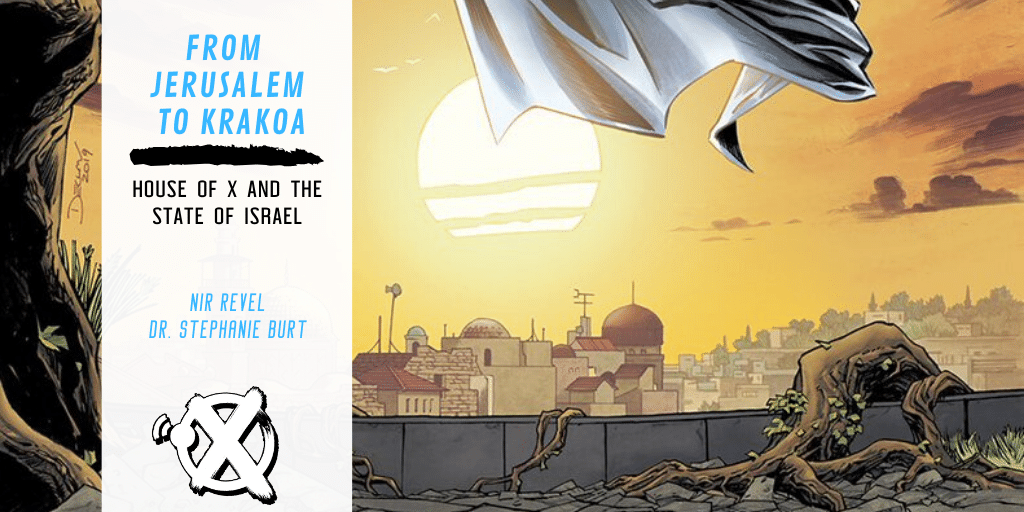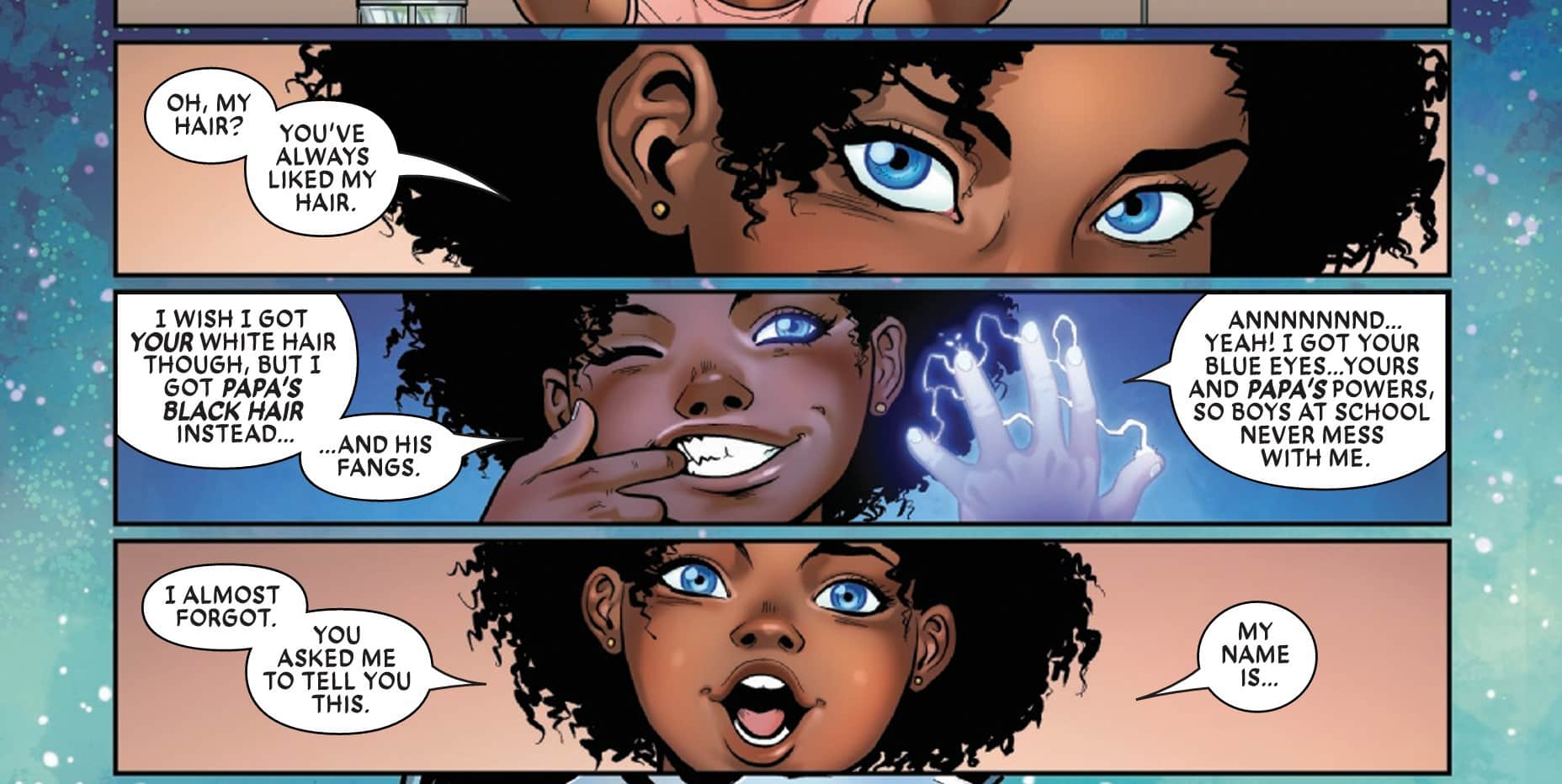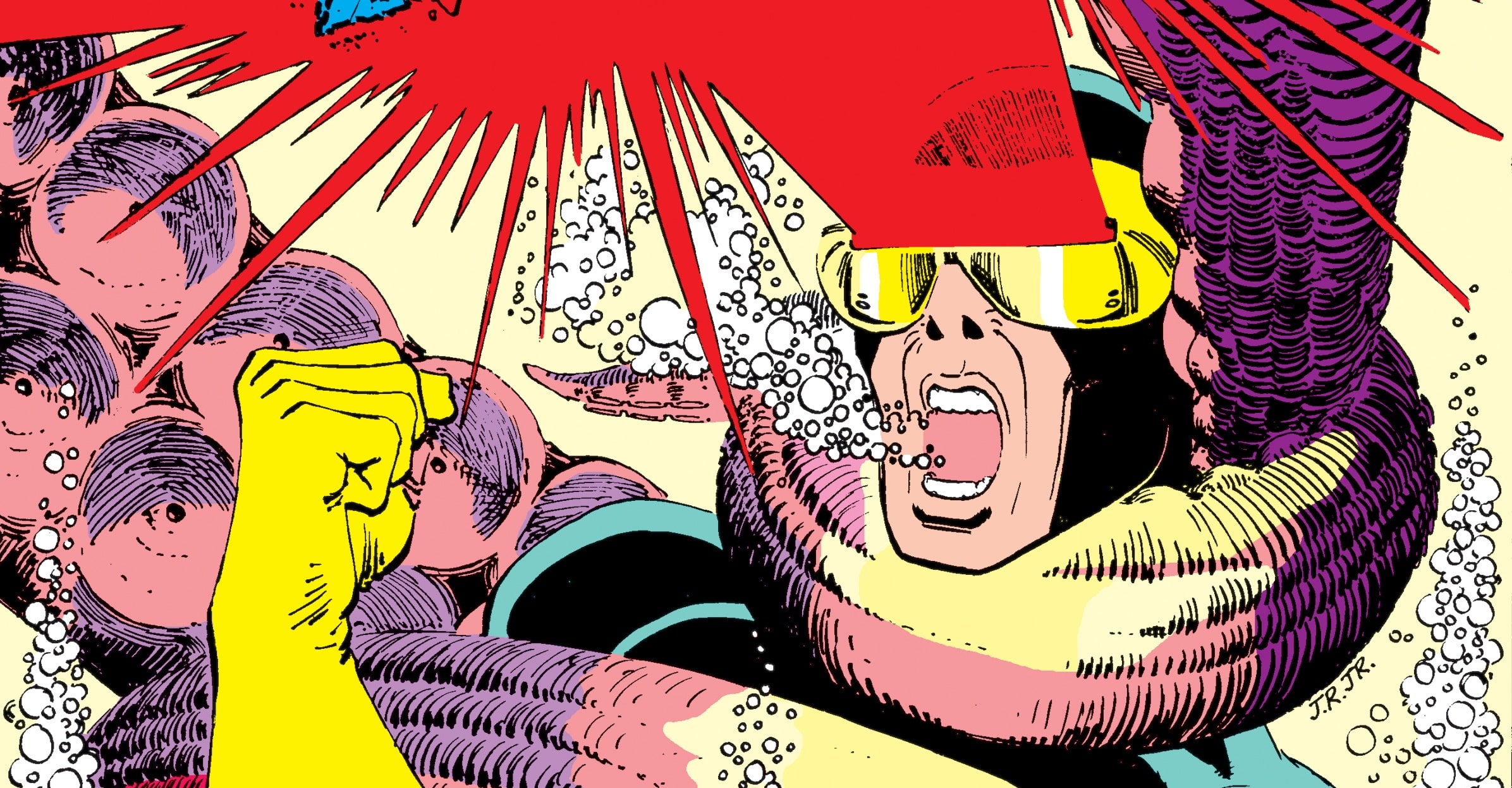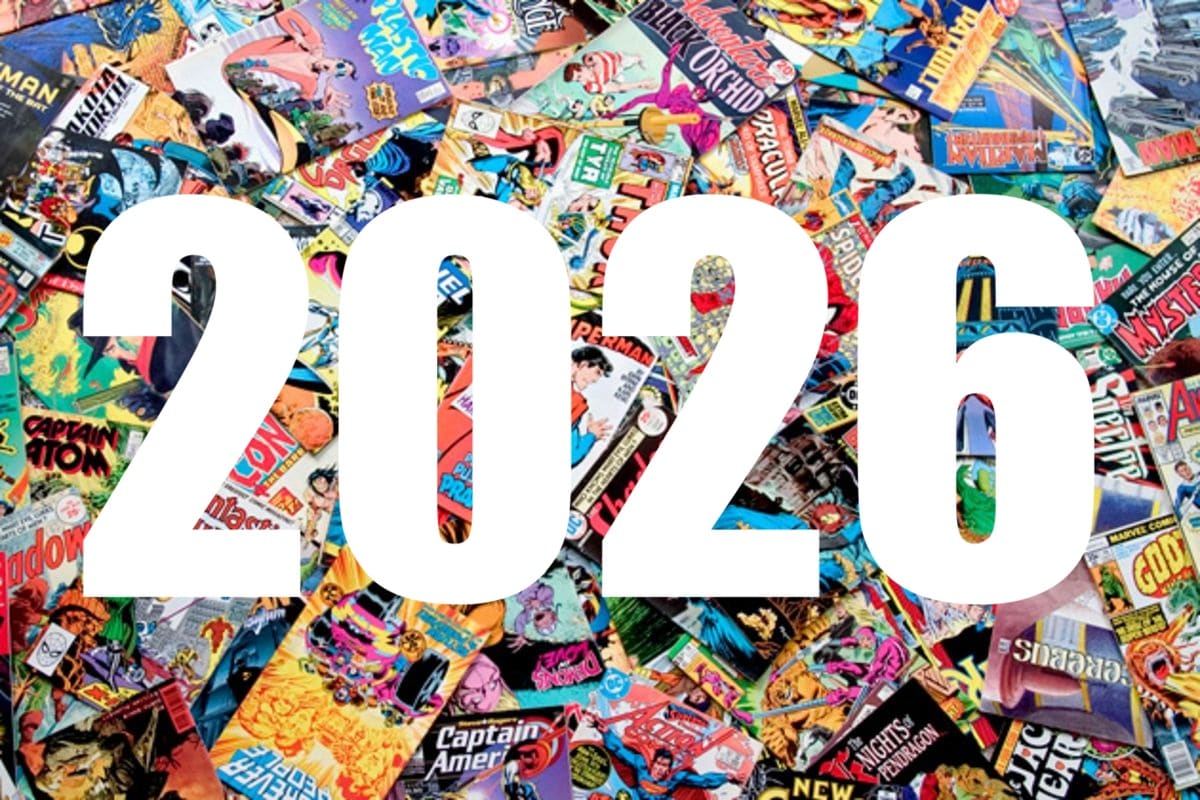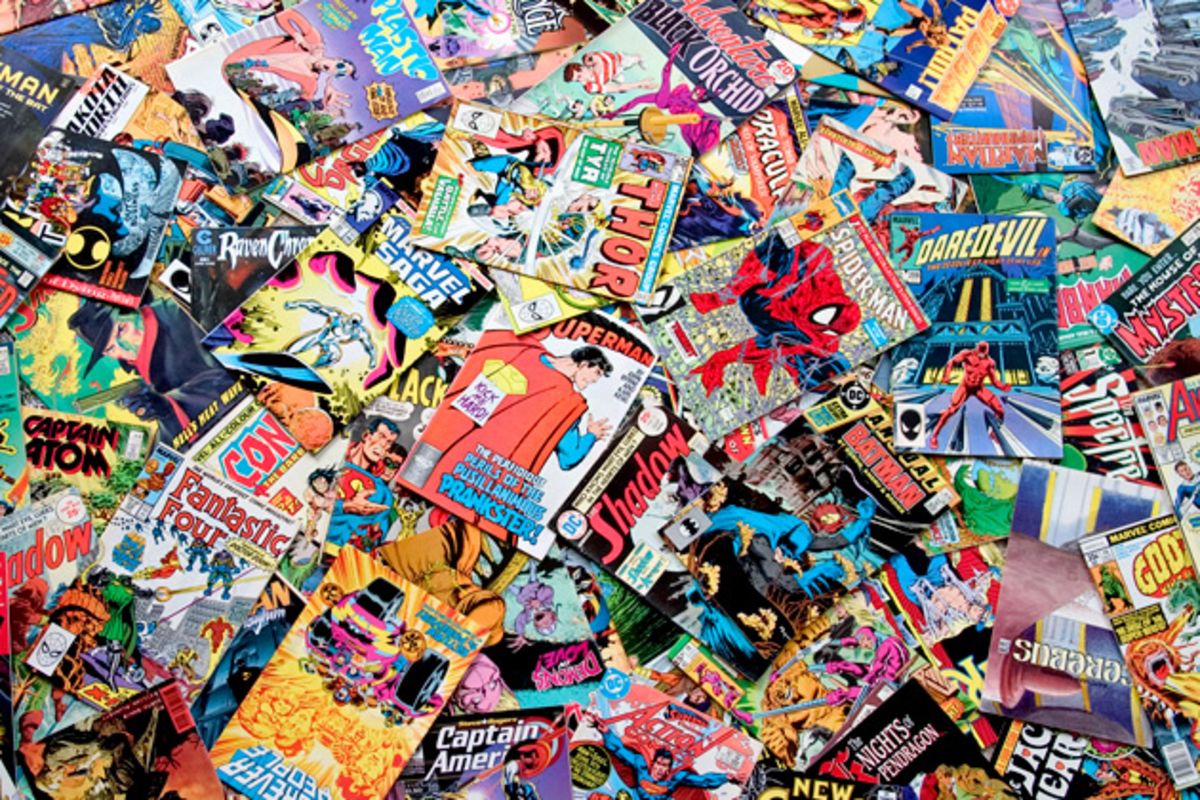This piece comes to us from Nir Revel & Stephanie Burt.
Nir is an EMT and Israeli Citizen who’s just good at making friends and being at the right place at the right time.
Stephanie is Professor of English at Harvard and the author of several books of poetry and literary criticism, most recently Don’t Read Poetry: A Book About How to Read Poems (Basic, 2019). Her nose still hurts from that thing with the gate.
A well-known minority group has members all over the world: some are visible like it or not, while others can blend in. Members of this group have been viciously persecuted; some still are today. More than one government has tried to wipe them out. Members of this group supposedly have special aptitudes, handed down through generations. They’re also targets for racist canards, blamed for events they did nothing to cause.
After an especially harrowing attempt to wipe the whole group off the map, powerful surviving members bring their talents—military, political, agricultural, linguistic—to a piece of land with historic importance for them. There they revive, or synthesize, a language, create infrastructure to house people who move in (oftentimes covertly), and make their case to other nations. After a brief and very newsworthy struggle, and a United Nations vote, the country achieves international recognition.
The new nation operates under unusual laws: any member of that group from anywhere in the world can settle there permanently. The rulers of that nation must prevent group members from fighting among themselves, while developing an advanced economy, showing what they can sell to the rest of the world. At the same time, they remain under existential threat from historical enemies; no wonder they seem, to outsiders, unusually focused on displays of strength.

That’s one story about the state of Israel, especially as told by the state of Israel, and by its defenders, rooted in the heyday of Labor Zionism, before the 1967 Six Day War. It’s the story many diasporic Jews, and Israeli children, learned growing up. It makes a debatable fit for the historical state of Israel, because, of course, it emphasizes Jewish history, and not the story of Palestine: Palestinians, and modern Israeli historians, tell concurrent but also well-documented, and sometimes horrifying, stories. But it is the story of Krakoa, the Mutant nation on a living island, whose origins are the subject of House of X and Powers of X: a story of “Mutantkind planting their flag in a plot of Earth and declaring it theirs.”

X-Men stories speak to many real-world groups, often without naming them: that’s the beauty of the Mutant Metaphor. But they have kept clear connections to Jewish identity. Stan Lee and Jack Kirby were Jewish, and the subtextual Jewishness in many of their Silver Age heroes has become proverbial. Scott, who can never remove the visible signifier of his identity; Hank, who wants to be at once the know-it-all and the jock; Bobby, the accountant who never lives up to his parents’ hopes; Warren, WASPier than any real-life WASP…. any of them could have come from a midcentury novel about American Jews and assimilation.
Chris Claremont, who wrote X-Men comics from 1975 to 1991, spent part of 1970 on a kibbutz; “the experience changed me,” he said later. He met Holocaust survivors, observed strong women whom men saw as equals, and watched “armed volunteers patrolling the property.” Claremont and his collaborators in Uncanny X-Men #150 made Magneto a Holocaust survivor, turning him from histrionic Silver Age villain into a complicated sometime-hero, the future headmaster of Xavier’s school.

Claremont and John Byrne also introduced Kitty Pryde, who wears a Star of David in her first appearance, and whose Jewishness lets her understand Magneto. “I don’t look or sound Jewish,” she explained much later, to the time-displaced original teenage X-Men in All-New X-Men #13, written by Brian Michael Bendis. “You might not know unless I told you. Same goes for my mutation.” She doesn’t have to tell or show strangers that she’s Jewish, nor that she’s a mutant, but the grown-up Kitty chooses to do so, in part to protect others, and in part out of, yes, pride. Kitty—now Kate— continues to stand for diasporic Judaism, for the millions of Jews who choose not to settle in the Jewish homeland. Her life continues to offer dilemmas about fading into the background or standing out, about passing and coming out, about minority visibility and erasure. She herself, and her many fans, ask how much violence her struggles—as a sympathetic minority figure in a hostile world—ought to involve. And even the living island itself—not to mention the X-Writers—may see her that way; she makes sense as a Jew in the goyische world.

Claremont’s mutant comics also spoke, explicitly, about Israel. The writer himself said that Magneto’s journey from lawless revenger to troubled and trustworthy elder was meant to parallel Menachem Begin, the leader of Israel’s main right-wing political party, who ran an Irgun cell during the 1930s and 1940s: the Irgun (who might today be labeled both terrorists and freedom fighters) took actions against British rule that the more lawful Haganah would not perform. Democratically elected along with his Likud Party in 1977, Begin negotiated a cold peace with Egypt at Camp David in 1979, one that holds to this day. New Mutants #26-27 introduced David Haller, the mutant son of Charles Xavier and the Israeli Ambassador to Britain. Codenamed Legion for his multiple personalities, Haller cannot emerge from his catatonia until those personalities learn to coexist. One personality is Jemail Karami, absorbed into David’s mind after a terrorist attack. Another is the swaggeringly violent Jack Wayne, who wants the New Mutants to kill Karami (“the Arab”) in order to free the real David. Professor Xavier goes along, but the Cheyenne mutant Dani Moonstar demurs, noting Jack’s resemblance to an Indian-killing movie cowboy. She’s right: what Jack wants is not freedom but violent dominance, and Jemail, converted from radicalism by residence in David’s head, points to the cooperative, non-murderous resolution the story requires.

X-comics, then, were no stranger to Israel and Palestine before the Hickman era. And yet the Krakoan comics of 2019 speak to Israeli history with unmatched detail. The story of Krakoa will be central—as Legion’s and even Kitty’s stories were not—to all mutant comics going forwards. And it has point-by-point parallels to people, ideas and events that built the Israeli state.
The run-up to the Krakoan era, the mutant comics of 2018 and early 2019, portrayed systematic attempts to eliminate mutants as a distinctive population. In Nate Grey’s failed utopia, Age of X-Man, everybody is a mutant, and there is no such thing as religion (Nate even destroyed the Vatican and the Temple Mount before constructing his alternate world). In the concurrent title Uncanny X-Men there are few mutants left alive, and those who are die one by one, sometimes in grisly ways. It’s hard to read, and problematic in its on-page violence, but it’s also a culmination of sorts for decades in which the X-Men tried to live among normal humans, on their terms (X- editor Jordan D. White called it “the Extinction era”. In Uncanny X-Men #21 (2019) Emma Frost has erased the knowledge of mutants’ very existence from all baseline humans, using a souped-up Cerebro: it’s a proposal that parallels total assimilation, Jews becoming literally invisible. Scott vetoes the plan, and Emma reverses the hack. Mutants will stay distinct, and stick together. How will they survive?

The answers in this summer’s comics—especially in the six-issue House of X—parallel the growth of Zionism and the birth of the Israeli state. Krakoa builds habitats around the world, with one in Jerusalem, each linked to the island by a vegetal gate. Only mutants can pass through the gates: anyone else “must ask for permission…. Krakoa recognizes its own.” Cyclops tells the well-intentioned Sue Storm that his people “spent our entire lives being hunted and hated…. Did you honestly think we were going to sit around forever and just take it?” “You’re safe here,” says Professor X. “We all are.” But of course their safety depends upon others’ self-sacrifice, upon military technology (a spacecraft), upon constant defense against bigots and external threats, in this case the Orchis regime, whose six-petaled flower resembles the fleur-de-lis (emblem of often anti-Semitic French Royalists) as well as the lotus-flower symbol of the Hindu nationalist BJP.

Then there is language. “Krakoan was created by Douglas Ramsey to be mutantdom’s first autochthonous language,” “a manufactured language and not the native language” of the living island. Modern Hebrew, too, was revived on purpose. Krakoan script makes no sense to humans, just as Hebrew script would make no sense to almost any non-Jew (barring Biblical scholars) in, say, 1910. “It’s certainly not Russian, English, French or Chinese,” Magneto tells a trio of ambassadors, “but it is a language. Ours… One cannot create a distinct culture without it.” He makes, almost verbatim, the arguments of Eliezer Ben-Yehuda (1858-1922), who began the revival of spoken Hebrew in what was then called Palestine. Doug Ramsey then matches Eliezer’s son Ben-Zion, the first native speaker of modern Hebrew.

The new state also has its own criminal justice system: “we don’t answer to you anymore,” explains Emma Frost, taking Sabretooth into mutant custody. Mutants begin to establish their own legal code, with both religious and secular precedents. So did Israel, drawing on two thousand years of traditional Jewish legislation, for better or for worse. Krakoa is a place of rebirth, as well as of self-sacrifice. The ritual re-creation of deceased mutants on Krakoa renders literal the re-making of Jewish culture after the Holocaust: no wonder so many readers found the religious, almost apocalyptic, celebration in House of X 5 somewhat disturbing, and unapologetically strange. “They’ve murdered so many of us, the world has grown used to it,” muses Charles. “This is just… how things are for those people… No more.” Six pages of black-and-white headline collage in House of X #4 emphasize the history of actual murder and attempted genocide, highlighted by the destruction of Genosha, flagged by the words “No More” alone on a page. No more death, literally (because they can resurrect mutants), but also no more human attempts to wipe out all mutants: as the real-world slogan has it, “Never Again.” (The slogan appears to originate, in Yiddish, with the Warsaw Ghetto Uprising: “Enough. We will not die like slaves. Never again [“keinmal meyr”].)

The leaders of the Krakoan state place a great deal of weight on UN recognition: “we will happily go through the same process as any newly formed nation,” Professor X says, though he has already told the world Krakoa is a fact. “While you slept, the world changed”. This emphasis echoes United Nations Resolution 181, which recognized, in November 1947, the new state of Israel—six months after David Ben Gurion had issued the Israeli Declaration of Independence. “No one forgets a founder of a nation,” says Magneto, positioning himself and Charles, not as Begin but as Ben-Gurion, trying to unify long opposed factions, showing one face to a skeptical world, while positioning Scott and his team as the new mutant nation’s army.

In both cases the national leader must hold together secularists and fighters motivated by religion: even Apocalypse, careless of human life, devoted to the survival of the fittest, must be kept within the fold. “We are together or we are nothing,” says Xavier. “We are one people.” Mutants must not only stay together, as Magneto tells Lorna; they should also stay in one place “a good place,” “fertile and ours,” a place to grow a “Society” Magneto goes on to explain, “Mankind didn’t really take off as a species until hunting and gathering ended and they transformed into an agrarian culture”; it’s a commonplace of anthropology, but it sounds especially close to the claims in Sapiens: A Brief History of Humankind, by the Hebrew University history professor Yuval Noah Harari, who has also argued that other species and life forms will someday replace humankind.
If Krakoa’s founding looks like the leadup to 1947-48, life there can look like the dream of Labor Zionism, the Kibbutzim—collective settlements, usually agricultural, devoted to cooperation and community, with property managed in common. Children on Krakoa play in groups, supervised by trustworthy mutants like Storm. “The children were not regarded as the exclusive property of their biological parents,” writes the scholar David Gavron of life on the kibbutzim; instead children “belong to the whole community.” Likewise on Krakoa. Some mutants are born, or reborn there; others migrate to a chosen homeland, “by the power that is their birthright” (as Storm puts it). Birthright is the name of a real-world charity that sends Jewish teens to Israel, in the hopes that all will support its existence, or at least learn Israeli perspectives, and that some will move there, or make Aliyah (literally “ascend”).

The gates present problems analogous to the actual state of Israel’s Law of Return, which has to answer the question “Who is a Jew?”. The Nazi regime defined Jewishness by descent, marking for murder people with Jewish grandparents whether or not they practiced the religion. The Law of Return, as amended in 1970, permits the immigration of otherwise non-Jewish spouses, children and grandchildren. Will the island behave in the same way? What’s the in-universe reason the gates won’t take Kitty? Can Karma bring her siblings? Mutants de-powered as a result of M-Day (Melody Guthrie, for example) presumably get in, but what about Ma Guthrie? Can she only get through the gates, or live on the island, with Sam? We can hope and expect future stories will ask such questions; for now it seems safe to say that the mutants on Krakoa will accept anyone who is persecuted for their status as a supposed mutant.

“At some point,” says one ambassador in House of X 1 to Magneto, “we have to talk about the military aspects of all this.” Without some threat of violence somewhere we would not be reading a superhero comic. Nor we would have an analogy to the state of Israel, though the analogy also breaks down. “We’ve never conquered a people,” Magneto answers the ambassador. Nor have mutants “stolen their land… That’s our real advantage.” He’s denouncing European and white colonialism, but he’s also calling attention to the major difference between Krakoa and Israel, while also falling into the same trap as nineteenth- and twentieth-century romantic Zionists: the notion that because a people have never been colonialists, or oppressors, before, they will not or cannot become oppressors now. HoXPoX has no equivalent for Bedouin, Palestinian Arabs or other non-Jews who live or have lived in what is now Israel (never mind the Occupied Territories). Krakoa, Magneto continues, “is ours and ours alone.”

The government of Israel calls the conflict of 1947-48 the War of Independence. Palestinians often call it the Nakba, Arabic for disaster. Hundreds of thousands left—often driven forcibly from—their land and their homes. Arab Israelis today comprise about one-fifth of the state’s population, which does not mean they subscribe to the Zionist dream: far from it. (The highly controversial 2018 revision of Israel’s basic law is purposely worded so vaguely that it seems to deny Arabs equal citizenship, to the frustration and horror of many Israelis.) Broad-brush discussions of Israeli history cannot omit such facts.
But nothing comparable applies to Krakoa. The mutant island is not the nation Theodor Herzl and his successors got so much as the one they wanted: a place where a radically dispossessed and persecuted people, one possessed of a remarkable heritage, could thrive, and reinvent a language, and unite warring factions, not around a belief but around a previously unoccupied land, where they could be themselves. It is a dream of safety and security, for a people and for a culture, that might have more resonance today, on this Earth, once we realize that it applies not only to Zionism and to Jews, but to other people with a distinctive language and history who face extermination from other quarters.
Such parallels between Krakoa and Israel suggest that future X-Stories will address these subjects further. They do not necessarily put the implied author of every X-Story, the perspective of every future X-Comic, on a pro-Krakoa (much less a pro-Israel) side. (We can look forward to Fallen Angels, in particular, for demurrals.) They add up to a story about the inherited complexity of all societies, not (or at least not just) about problems specific to Israel. And they also cast light on the controversy that current X-stories seem to generate: online fans and skeptical journalists seems to be asking “are the X-Men now villains?” with special force just now, just when Marvel’s mutants are moving (not for the first time) from a minority to a nation. The Krakoan state has its origins in persecution, in the near-erasure of mutants from Earth, and in protection, ingathering, shelter; and yet its maintenance involves drawing lines, bringing some people in, keeping others out. Boundaries—geographic, legal, cultural—may be the dark side to any and every nation. House of X does not tell us how the future will handle them. But it does suggest—and strongly at that—to humans and to mutants, to readers on our Earth and to people on what appears to be the main Marvel Earth, what we might have to name a two-state solution: if you want your own group to have a nation, a territory for self-protection and self-governance, you ought to allow other groups to have the same.

Stephanie Burt is Professor of English at Harvard. Her podcast about superhero role playing games is Team-Up Moves, with Fiona Hopkins; her latest book of poems is We Are Mermaids. Her nose still hurts from that thing with the gate.

